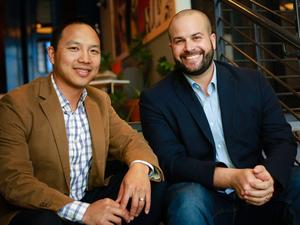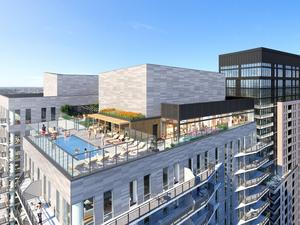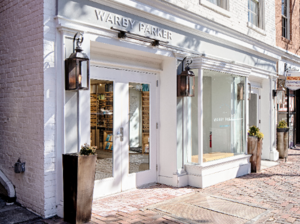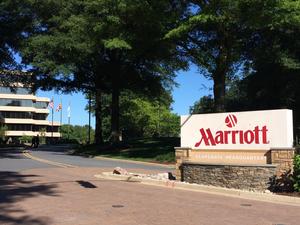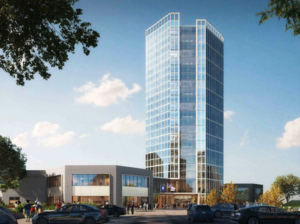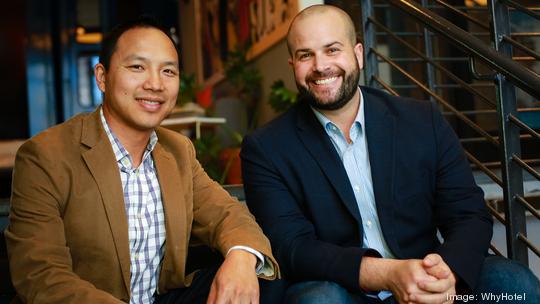
D.C. hospitality startup WhyHotel is rebranding to Placemakr at the same time it’s revealing a new $90 million funding raise, its largest to date by far.
Placemakr's focus has broadened during the pandemic to include not just temporary hotels but also longer-term property management — still with a hospitality twist. Now, 80% of the company’s business comes from what it calls its hospitality living properties, where it manages entire properties on a permanent basis, offering long, medium and short-term stays. And the model it was first known for — a vendor that worked with luxury apartment developers to run pop-up hotels in new buildings during the initial leasing phase — is moving to the background of the business.
Hence, a new name for the 5-year-old company. “The reason we’re going through a rebrand is, they’re not just hotel style, they’re home style,” said Jason Fudin, co-founder and CEO of WhyHotel, now Placemakr. “And so what we wanted to do was have our brand be reflective of the customer product.”
Pop-up hotels will remain part of its business model, and those will be known as "WhyHotel, by Placemakr."
The new model has been in the works since before the pandemic, but the events of the past two years accelerated the idea, Fudin said. The travel and hospitality industries have struggled during the pandemic, though Fudin told the Washington Business Journal in 2021 that its hotels had maintained 85% occupancy up until that point in the pandemic.
Layoffs at the company told a somewhat different story, though; WhyHotel laid off “a significant portion” of its employees and instituted mandatory 14-day minimum stays during the pandemic. It had backed off of ambitious pre-pandemic plans to open more than a dozen new locations in 2019 and 2020 and grow revenue to up to $200 million in 2021. But as it's rebuilt in recent months, the company has returned to hiring and is at nearly 200 employees today, its CEO said.
Fudin plans to double that figure this year with a combination of employees based at the company’s properties as well as remote, “nonproperty” employees. Although headquartered in the old Uline Arena at 1140 Third St. NE, the company employs a distributed staff based in some 28 states, Fudin said.
It’s also doubling down on its flexible hospitality living model. Its $90 million in new funding, which makes up a significant part of the total $125 million Fudin said it’s raised to date, will flow toward that effort. The company's investors have included Harbert Growth Partners, Highland Capital Partners, Working Lab Capital, Mendacre, MetaProp and Geolo Capital, as well as local investors Camber Creek and Revolution’s Rise of the Rest Seed Fund
The new dollars will go toward investments in not just its tech infrastructure, but also toward property acquisitions. “We plan on buying more buildings,” Fudin said.
Already, the company said it's purchased $250 million worth of sites last year, but plans $1 billion in total acquisitions within the next two years. Currently, the team owns at least one building — its Placemakr Premier SoBro location in downtown Nashville — and has partnered with Davidson Kempner Capital Management, Gaw Capital and Bernstein Management Corp. on further real estate acquisitions.
Nowhere in the U.S. is out of the question for Placemakr’s next expansion, said Fudin, a former strategic initiatives executive at Vornado Realty Trust, which spun out WhyHotel in 2017. Fudin had partnered with Bao Vuong, a former PN Hoffman development executive, to establish the company back then. The company has listed JBG Smith Properties (NYSE: JBGS), which inherited Vornado's D.C.-area portfolio in a massive M&A deal in 2017, as a real estate investment partner.
Ultimately, however, Fudin said Greater Washington remains an important market, where it currently operates in at least four properties, including Tysons, Union Market, 2500 Penn and Kiley Apartments in Southwest D.C. Those are in addition to locations in midtown Miami, New York City's Wall Street neighborhood and Nashville.
“We’ll be making a bunch of announcements about D.C. metro projects,” Fudin said. “This continues to be kind of the crown jewel portfolio, in terms of the quality and volume of inventory we have, and that will only continue to grow.”
He sees a lot of growth in the young startup’s future, in spite of growing competition from the likes of newly public San Francisco hospitality startup Sonder Holdings Inc. (NASDAQ: SOND), which also operates properties in Greater Washington and reported a doubling of its annual revenue to nearly $233 million last year, along with $400 million in fresh capital. Big brands have delved into the pop-up hotel niche, while stalwarts such as Marriott International Inc. (NASDAQ: MAR) still pose a competitive challenge.
But Fudin points to plenty of room to grow for Placemakr. “This is a really nascent market,” Fudin said. The more quickly the line blurs between hotels and multifamily apartments, he said, “the bigger the opportunity for us as an organization because it will be a very, very large space.”
